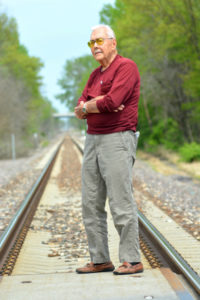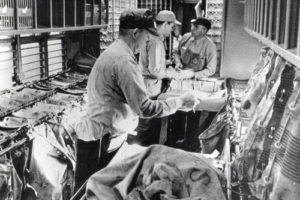Former Railway clerk Kenneth race remembers his time working on the Railway Post Office
More than 60 years ago, Sherman, IL, resident Kenneth Race worked for the U.S. Postal Service® as a clerk with the Railway Post Office (RPO).
“I was happy to get a job with The Postal Service® because the pay was pretty good and I was starting a new family. Before they put me on a train, I first had to learn how to sort the mail at a regular Post Office™. There were no ZIP Codes back then, so you had to learn cities and where they were in the state, north or south, etc. We would get tested on our sorting for accuracy and speed all the time,” said Race.
Clerks sort mail in the cramped interior of a Railway Post Office (RPO). RPO interiors typically ranged from 15 to 60 feet long and were about 9 feet wide. Tight-knit crews of up to 20 men worked in the larger cars, racing the clock to sort mail in time for dispatch to the stations en route. “Working the mail” consisted of sorting letters into “pigeon hole” distribution cases and tossing mail accurately into labeled pouches, correctly routed to as many as 5,000 destinations. Whenever one man finished his work he often pitched in to help another. Clerks had to memorize complex distribution schemes and studied and practiced continuously in order to pass regularly-scheduled examinations. – Collection of United States Postal Service
Soon, Race became a regular on the train route. “Once I learned how to sort, they said it was okay for me to go on the road, and I would get assignments. I would hop on a passenger train and ride up to Chicago, IL. Once I was there, I would get on another train and ride back to St. Louis while sorting the mail. After a while, I became full time and then I could live anywhere along the route and just hop a train to get to work.”
Working conditions in the Railway Post Office were different back then, with no regulations against smoking at work, explains Race. “About six of us would be in the car at the same time, and back then everyone was smoking. Sometimes a combination of all the smoke and the rocking motion while sorting mail would make us sick.”
Race was also responsible for protecting Registered Mail®, elevating the sanctity of the mail to a whole new level. “At the end of our run, if we got any Registered Mail they would hand you the sack and a gun so you could guard it while you took it to the Postmaster. I was never sure that I would want to have a gun fight over that bag of mail but luckily I never had to make that decision.”
The Postal Service stopped sorting mail aboard trains in 1977, which meant the end of the line for the Railway Mail Service and for Race. He left USPS to work for the Springfield Fire Department and later the Illinois State Fire Marshall’s Office. “I worked for the Postal Service until they began phasing the job out. To stay on I would have to move my family to another town. We ended up parting ways, but I will never forget my time on the train.”

